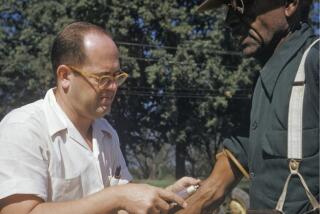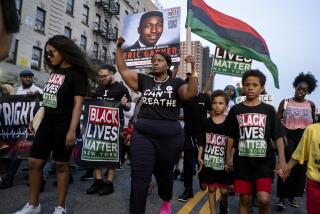Study Showing a Race Gap in Military Spurs Call to Action
- Share via
WASHINGTON — Defense Secretary William S. Cohen called for a military-wide review of conduct Tuesday after a Pentagon study said up to 75% of blacks and other ethnic minorities reported experiencing racially offensive behavior.
At the same time, a companion study indicated the percentage of minority and female officers had more than doubled in 20 years.
Cohen, in a letter to service chiefs, said the survey on race relations, the most extensive ever taken by a government agency, should be used as a guide “as we work to improve our processes and practices.”
“There is no place for racism in our society,” Cohen told a Pentagon news conference. “There is certainly no place for it in the military.”
The 296-page congressionally mandated survey was conducted in late 1996 and early 1997. It was mailed to 76,754 active duty enlisted Army, Navy, Air Force, Marine and Coast Guard members and officers. More than 44,000 were returned.
The report indicated that racial minorities in uniform remain more pessimistic than whites about their chances for advancement.
Seventy-five percent of blacks and 67% of Latinos said they had experienced racially offensive behavior in the 12 months before the survey was taken, compared with 62% for whites.
Even though the military prides itself on moving against discrimination, major differences remain between whites’ and minorities’ perceptions of progress, the survey said.
For example, while half of white service members believed investigations into racially offensive conduct were thorough, only 38% of blacks and 39% of Latinos felt that way, according to the Armed Forces Equal Opportunity Survey.
About 18% of blacks and 13% of Latinos said they believed they were given poor assignments or evaluations based on race, compared with 4% of whites.
At Ft. Jackson, S.C., the report drew mixed reactions from Army officers outside the base’s retail store.
Staff Sgt. Sedrick Banks, who is black, said he hadn’t noticed overt racism in military units, but he encountered it while in training--derogatory comments that he said included “the ‘n’ word.”
“I would tend to agree with what’s written,” Banks said, referring to the report.
But Capt. Katrina Birkelien, a white Army nurse who participated in the survey, said she has never been in a unit where punishment varied according to race. And rewards also have seemed fair, she said. “I think opportunity is based on merit. That’s what I’ve seen.”
“We would all like to have had us perform better. This survey is a declaration of action,” said William E. Leftwich III, assistant Defense secretary for equal opportunity. “More attention and effort” are needed, he said, although the Pentagon has no specific proposals for addressing the problem.
Margaret C. Simms, research director of the Joint Center for Political and Economic Studies, a think tank that specializes in racial issues, said the survey undermines the notion of racial harmony that the military attempts to project.
“I’m sure that the disappointing thing for leaders in the military is the fact that there still remains some significant amount of at least perceived differences in terms of opportunity. This now presents the military with a chance to take steps that might make them better,” she said.
The report found there was “a strong propensity not to report” racially offensive encounters.
While 74% of white service members said they believed their immediate supervisors made honest efforts to stop racial harassment, only 58% of blacks and 63% of Latinos felt that way.
Still, members of all races expressed the view that race relations were less positive in local civilian communities than on military bases and ships.
Only 28% of the blacks who responded to the survey reported that community race relations were good. That compares with 34% among whites and Latinos.
On a more positive note, large majorities of all racial groups indicated that they had close personal friendships (84%) or socialized (85%) with people of other races. More than half (52%) indicated they had more friends of another race now than they did before entering the military.
Nearly all service members (95%) responding indicated they did not know anyone who belonged to an extremist organization.
And 46% of respondents said they thought race relations in the military had improved over the last five years. Only 30% gave that answer for the nation as a whole.
The study reinforced conclusions drawn by others of nonmilitary populations that “minorities have a very different perspective than whites” on many things in life, said Anita Lancaster of the Defense Manpower Data Center, which ran the study.
More to Read
Sign up for Essential California
The most important California stories and recommendations in your inbox every morning.
You may occasionally receive promotional content from the Los Angeles Times.













